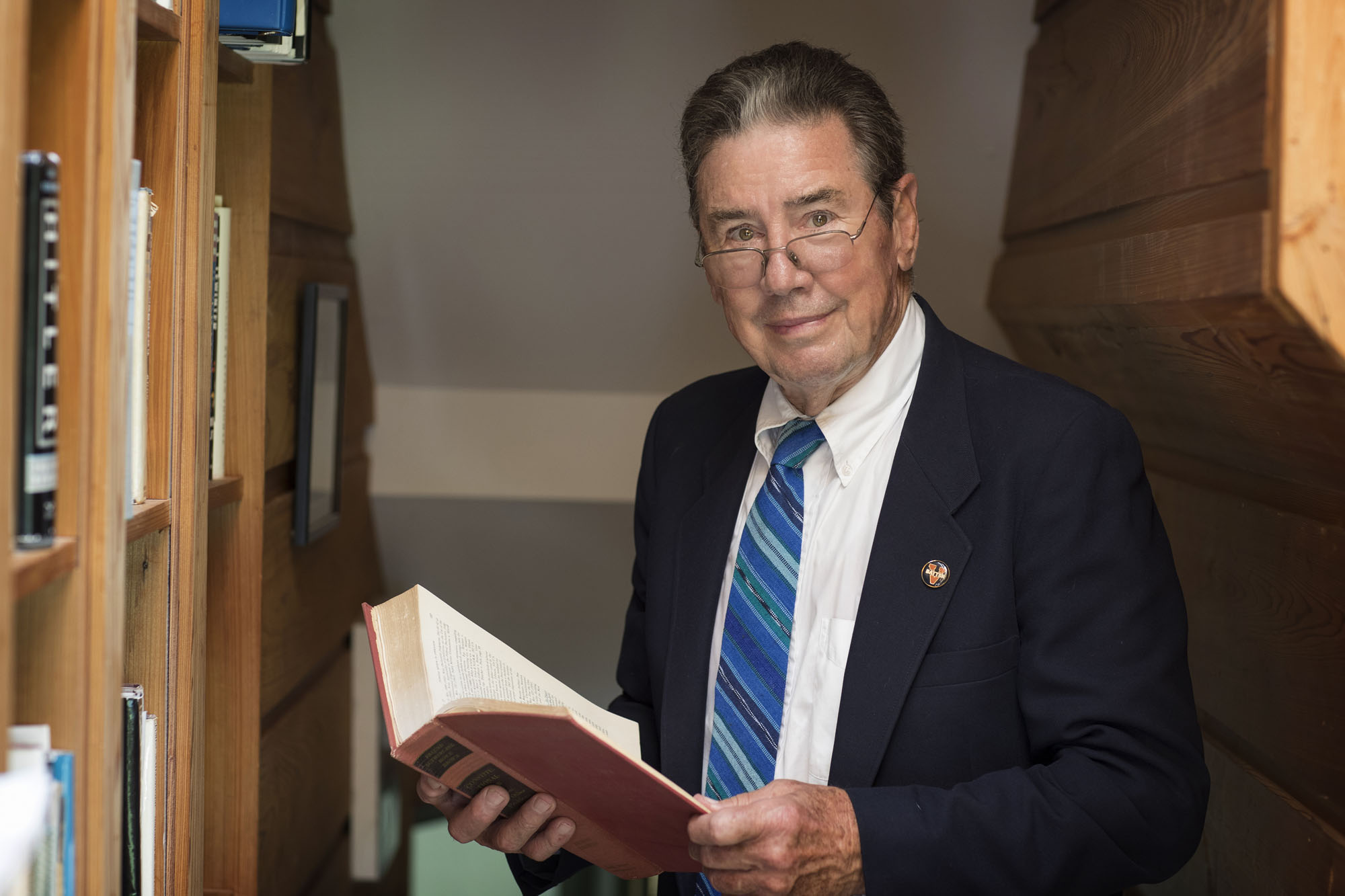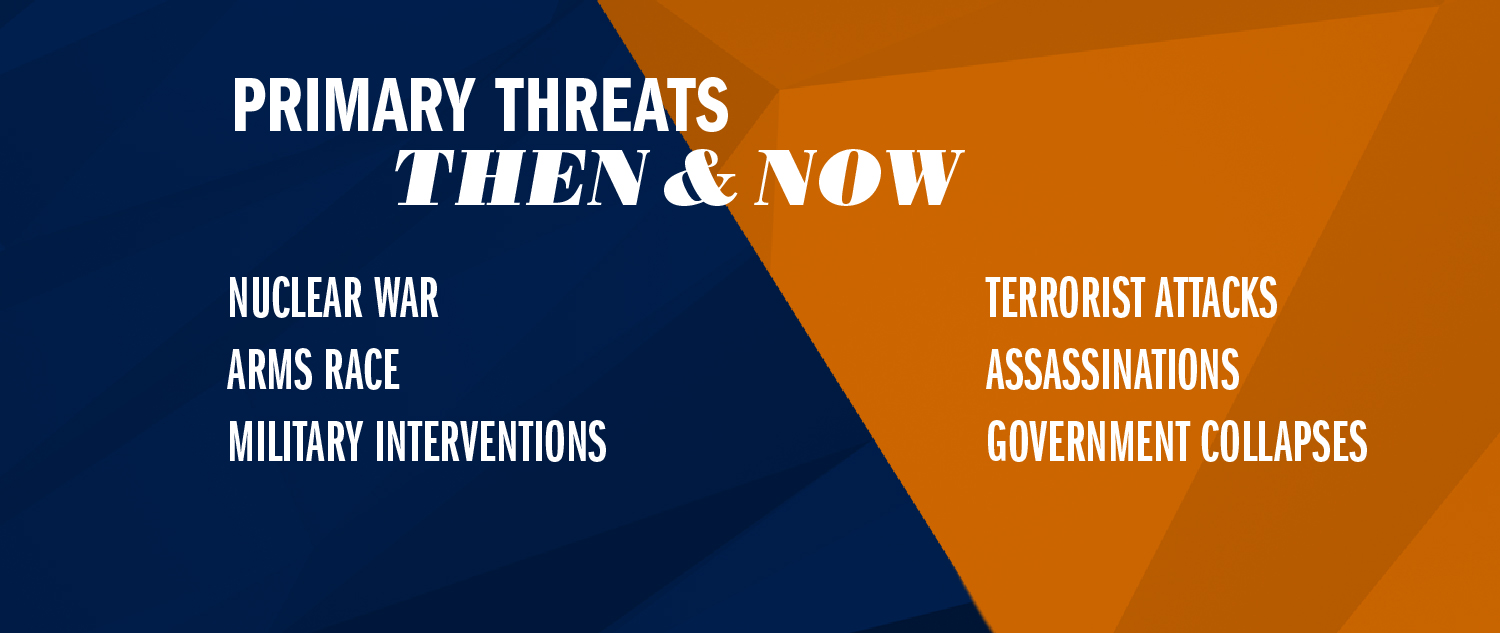Before there was Edward Snowden, there was Aldrich Ames. Each man betrayed state secrets. Each had his own reasons. Snowden’s release of reams of information about government surveillance was prompted by indignation, he has said. For Ames, who outed several Russians spying for the United States, the motivation was money.
As Hollywood director Oliver Stone premieres “Snowden,” his new film on the computer professional’s exploits, UVA Today shares the story of University of Virginia faculty member Frederick Hitz, who, as the Central Intelligence Agency’s inspector general in the 1990s, was tasked with discovering how CIA officer Ames became a double-agent and was able to spy for years, seriously compromising U.S. intelligence-gathering in the Soviet Union in the last years of the Atomic Age.
A Betrayal
The Ames affair revealed deep problems at the CIA. How could a man, who was known to be an alcoholic and whose career trajectory had stalled, spy for the Russians for nearly nine years and go undetected?

Frederick Hitz teaches in the Frank Batten School of Leadership and Public Policy, is an adjunct professor in the School of Law and a senior fellow in UVA’s Center for National Security Law. (Photo by Dan Addison, University Communications)
Clues were everywhere. Once an unkempt man, the Russia analyst returned to Washington, D.C. from a post in Rome wholly changed. His unsightly teeth were capped, his clunky eyeglasses were replaced with a sleek new pair and he was sporting tailored Italian suits. Ames paid cash for a half-million-dollar home and drove a Jaguar. The new affluence was unexplained and out in the open for all to see.
To get answers, the CIA looked in the mirror. The man doing the gazing was Hitz, who was appointed the first statutory Inspector General of the CIA by President George H.W. Bush in 1989, following the Iran-Contra fiasco. His appointment required Senate confirmation. He is now a senior lecturer in public policy in UVA’s Frank Batten School of Leadership and Public Policy, an adjunct professor in the School of Law and a senior fellow in UVA’s Center for National Security Law.
An Arrest That Shook the CIA
The first security breach was discovered in 1985. Ames was arrested Feb. 21, 1994 and pled guilty to espionage two months later on April 28, a confession that would send him to a maximum-security prison in Pennsylvania for life. What happened in those nine years is contained in Hitz’ 700-page, still-classified report.
An unclassified abstract contains damning findings. In it, Hitz’ 12-person investigative team details Ames’ “professional sloppiness.”
Read these excerpts from the report:
“We have found that Ames was oblivious to issues of personal security both professionally – he left classified files on a subway train – and in his espionage – he carried incriminating documents and large amounts of cash in his airline luggage; he carried classified documents out of CIA facilities in shopping bags; and he openly walked into the Soviet Embassy in the United States and a Soviet compound in Rome. We have noted that Ames’s abuse of alcohol, while not constant throughout his career, was chronic and interfered with his judgment and the performance of his duties ...
That an officer with these observed vulnerabilities should have been given counterintelligence responsibilities in Soviet operations where he was in a prime position to learn of the intimate details of the Agency’s most sensitive operations, contact Soviet officials openly and then massively betray his trust is difficult to justify. The IG investigative team has been dismayed at this tolerant view of Ames’s professional deficiencies and the random indifference given to his assignment.
Finally, on the grander scale of how the reaction to the major loss of Soviet cases in 1985-86 was managed, our team has been equally strict, demanding and greatly disturbed by what we saw. If Soviet operations – the effort to achieve human penetrations of the USSR for foreign intelligence and counterintelligence information – was the highest priority mission of the clandestine service of CIA in 1985-86, then the loss of most of our assets in this crucial area of operations should have had a devastating effect on the thinking of the leaders of the Director of Operations and CIA. The effort to probe the reasons for these losses should have been of the most vital significance to U.S. intelligence, but particularly to the CIA, and should have been pursued with the utmost vigor and all necessary resources until an explanation – a technical or human penetration – was found.”

Hitz said he didn’t hire any “outside guns” to help with the investigation. “I did it from within our organization because we did realize how sensitive it was and we wanted to have as low a profile as you could with something of that kind,” he said.
When Hitz was named inspector general in 1990, he persuaded a 1973 UVA Law School graduate to be his director of investigations. Hitz knew Rick Cinquegrana from previous work as an attorney in the CIA’s Office of the General Council. “I respected him as a very able lawyer. Then he’d gone over to the Justice Department for a tour and that even enhanced his credibility. So he became my chief of investigations and he had this case.”
Spy School
Hitz’s relationship with Ames did not begin with the probe. It can be traced back to 1967, when the two men entered the CIA’s career training class, or what Hitz called “spy school.”
Even then, he said Ames’ drinking problem was on full display. “We were a big class and I didn’t know him well. But he was drinking hard then,” Hitz said during a recent conversation on Charlottesville’s Downtown Mall. “The really key thing is that he was an alcoholic and nobody clamped down on him. There were times when he was fine and could discharge his responsibilities, and times when he was gone.”

The problem was compounded by federal rules at the time that said if Ames could do his job successfully, “The fact that he blew himself up every once in awhile in these benders didn’t disqualify him.
“Frankly, the agency had a history of heavy alcohol abuse over a long period of time because of the tensions created by the work,” Hitz said.
A Massive Leak
Hitz himself became the subject of scrutiny when his classified report on the Ames affair was mysteriously leaked.
This, from the Los Angeles Times in November 1995:
“Leaked details of the CIA’s classified report on the damage done by Ames have already sparked a firestorm of protest over the arrogance of the CIA’s permanent bureaucracy and raised fresh questions about the role the spy agency should play in the post-Cold War world.”
CIA Director James Woolsey wanted names. Who leaked the report?
“The then-director of Central Intelligence, Jim Woolsey, thought I might have done it, so he put me on the polygraph. The FBI polygraphed me,” Hitz said, incredulously, “his own inspector general.”
While bizarre, the episode didn’t jolt Hitz because he knew he was innocent all along.
Hitz said the leaked details caused a great deal of embarrassment to the agency because there were names of agents, some very senior, who were on duty when “Ames went down to the Russian embassy on several occasions and just handed over names of agents for dough” – $2.5 million over his nine-year spying spree.
The exact number of Soviet double agents who lost their lives because of Ames’ betrayal is not known because Hitz said it’s possible that others also were giving away information. “We figure that as many as 12 agents lost their lives. The Soviets called them home and executed them,” he said, shaking his head. Between eight and 10 others were incarcerated.

The report was delivered to the CIA director, joint commissions in the Congress and to President Bill Clinton.
“If you can’t protect the names of your agents, you’re not going to be in the spy business very long,” Hitz said. “We could not afford to have it bruited about that our security was sloppy; that we really didn’t care; that we really didn’t protect to the fullest extent the sources of information, or we just couldn’t stay in business.”
Lessons for Today
What was true during the Cold War remains true today, said Hitz, and that is the crucial need to have highly specialized agents who are versed in other countries’ languages and cultures. While sophisticated technology is important, he said, the agency needs human agents who know what is going on.
“Are we getting the information we need to about ISIS and critical matters like that? The answer is ‘no,’” he said. “We’ve got intelligence officers in the field and they can see the obvious phenomena. But how do they get access to these people? They don’t have any.”
And part of the problem is that it’s not easy, he said. “UVA does a nice job of getting students started on the Arabic language, but it’s not easy. It is very dialect-driven. Trying to make contacts at this particular juncture is next to impossible, unless you’re part of the tribe.”
Media Contact
Article Information
September 14, 2016
/content/spy-stories-how-uva-teacher-helped-cia-recover-betrayal

